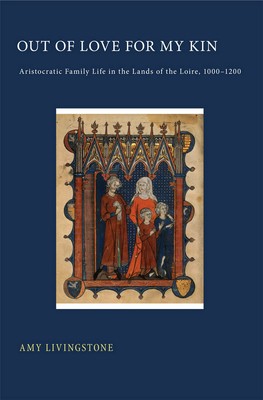
- We will send in 10–14 business days.
- Author: Amy Livingstone
- Publisher: Cornell University Press
- ISBN-10: 0801448417
- ISBN-13: 9780801448416
- Format: 15.5 x 23.6 x 2.5 cm, kieti viršeliai
- Language: English
- SAVE -10% with code: EXTRA
Reviews
Description
In Out of Love for My Kin, Amy Livingstone examines the personal dimensions of the lives of aristocrats in the Loire region of France during the eleventh and twelfth centuries. She argues for a new conceptualization of aristocratic family life based on an ethos of inclusion. Inclusivity is evident in the care that medieval aristocrats showed toward their families by putting in place strategies, practices, and behaviors aimed at providing for a wide range of relatives. Indeed, this care--and in some cases outright affection--for family members is recorded in the documents themselves, as many a nobleman and woman made pious benefactions "out of love for my kin."
In a book made rich by evidence from charters--which provide details about life events including birth, death, marriage, and legal disputes over property--Livingstone reveals an aristocratic family dynamic that is quite different from the fictional or prescriptive views offered by literary depictions or ecclesiastical sources, or from later historiography. For example, she finds that there was no single monolithic mode of inheritance that privileged the few and that these families employed a variety of inheritance practices. Similarly, aristocratic women, long imagined to have been excluded from power, exerted a strong influence on family life, as Livingstone makes clear in her gender-conscious analysis of dowries, the age of men and women at marriage, lordship responsibilities of women, and contestations over property.The web of relations that bound aristocratic families in this period of French history, she finds, was a model of family based on affection, inclusion, and support, not domination and exclusion.
EXTRA 10 % discount with code: EXTRA
The promotion ends in 22d.15:43:58
The discount code is valid when purchasing from 10 €. Discounts do not stack.
- Author: Amy Livingstone
- Publisher: Cornell University Press
- ISBN-10: 0801448417
- ISBN-13: 9780801448416
- Format: 15.5 x 23.6 x 2.5 cm, kieti viršeliai
- Language: English English
In Out of Love for My Kin, Amy Livingstone examines the personal dimensions of the lives of aristocrats in the Loire region of France during the eleventh and twelfth centuries. She argues for a new conceptualization of aristocratic family life based on an ethos of inclusion. Inclusivity is evident in the care that medieval aristocrats showed toward their families by putting in place strategies, practices, and behaviors aimed at providing for a wide range of relatives. Indeed, this care--and in some cases outright affection--for family members is recorded in the documents themselves, as many a nobleman and woman made pious benefactions "out of love for my kin."
In a book made rich by evidence from charters--which provide details about life events including birth, death, marriage, and legal disputes over property--Livingstone reveals an aristocratic family dynamic that is quite different from the fictional or prescriptive views offered by literary depictions or ecclesiastical sources, or from later historiography. For example, she finds that there was no single monolithic mode of inheritance that privileged the few and that these families employed a variety of inheritance practices. Similarly, aristocratic women, long imagined to have been excluded from power, exerted a strong influence on family life, as Livingstone makes clear in her gender-conscious analysis of dowries, the age of men and women at marriage, lordship responsibilities of women, and contestations over property.The web of relations that bound aristocratic families in this period of French history, she finds, was a model of family based on affection, inclusion, and support, not domination and exclusion.


Reviews